- Home
- Samuel Beckett
Three Novels: Malloy, Malone Dies, The Unnamable Page 2
Three Novels: Malloy, Malone Dies, The Unnamable Read online
Page 2
II
It is midnight. The rain is beating on the windows. I am calm. All is sleeping. Nevertheless I get up and go to my desk. I can’t sleep. My lamp sheds a soft and steady light. I have trimmed it. It will last till morning. I hear the eagle-owl. What a terrible battle-cry ! Once I listened to it unmoved. My son is sleeping. Let him sleep. The night will come when he too, unable to sleep, will get up and go to his desk. I shall be forgotten.
My report will be long. Perhaps I shall not finish it. My name is Moran, Jacques. That is the name I am known by. I am done for. My son too. All unsuspecting. He must think he’s on the threshold of life, of real life. He’s right there. His name is Jacques, like mine. This cannot lead to confusion.
I remember the day I received the order to see about Molloy. It was a Sunday in summer. I was sitting in my little garden, in a wicker chair, a black book closed on my knees. It must have been about eleven o’clock, still too early to go to church. I was savouring the day of rest, while deploring the importance attached to it, in certain parishes. To work, even to play on Sunday, was not of necessity reprehensible, in my opinion. It all depended on the state of mind of him who worked, or played, and on the nature of his work, of his play, in my opinion. I was reflecting with satisfaction on this, that this slightly libertarian view was gaining ground, even among the clergy, more and more disposed to admit that the sabbath, so long as you go to mass and contribute to the collection, may be considered a day like any other, in certain respects. This did not affect me personally, I’ve always loved doing nothing. And I would gladly have rested on weekdays too, if I could have afforded it. Not that I was positively lazy. It was something else Seeing something done which I could have done better myself, if I had wished, and which I did do better whenever I put my mind to it, I had the impression of discharging a function to which no form of activity could have exalted me. But this was a joy in which, during the week, I could seldom indulge.
The weather was fine. I watched absently the coming and going of my bees. I heard on the gravel the scampering steps of my son, caught up in I know not what fantasy of flight and pursuit. I called to him not to dirty himself. He did not answer.
All was still. Not a breath. From my neighbours’ chimneys the smoke rose straight and blue. None but tranquil sounds, the clicking of mallet and ball, a rake on pebbles, a distant lawn-mower, the bell of my beloved church. And birds of course, blackbird and thrush, their song sadly dying, vanquished by the heat, and leaving dawn’s high boughs for the bushes’ gloom. Contentedly I inhaled the scent of my lemon-verbena.
In such surroundings slipped away my last moments of peace and happiness.
A man came into the garden and walked swiftly towards me. I knew him well. Now I have no insuperable objection to a neighbour’s dropping in, on a Sunday, to pay his respects, if he feels the need, though I much prefer to see nobody. But this man was not a neighbour. Our dealings were strictly of a business nature and he had journeyed from afar, on purpose to disturb me. So I was disposed to receive him frostily enough, all the more so as he had the impertinence to come straight to where I was sitting, under my Beauty of Bath. With people who took this liberty I had no patience. If they wished to speak to me they had only to ring at the door of my house. Martha had her instructions. I thought I was hidden from anybody coming into my grounds and following the short path which led from the garden-gate to the front door, and in fact I must have been. But at the noise of the gate being slammed I turned angrily and saw, blurred by the leaves, this high mass bearing down on me, across the lawn. I neither got up nor invited him to sit down. He stopped in front of me and we stared at each other in silence. He was dressed in his heavy, sombre Sunday best, and at this my displeasure knew no bounds. This gross external observance, while the soul exults in its rags, has always appeared to me an abomination. I watched the enormous feet crushing my daisies. I would gladly have driven him away, with a knout. Unfortunately it was not he who mattered. Sit down, I said, mollified by the reflection that after all he was only acting his part of go-between. Yes, suddenly I had pity on him, pity on myself. He sat down and mopped his forehead. I caught a glimpse of my son spying on us from behind a bush. My son was thirteen or fourteen at the time. He was big and strong for his age. His intelligence seemed at times little short of average. My son, in fact. I called him and ordered him to go and fetch some beer. Peeping and prying were part of my profession. My son imitated me instinctively. He returned after a remarkably short interval with two glasses and a quart bottle of beer. He uncorked the bottle and served us. He was very fond of uncorking bottles. I told him to go and wash himself, to straighten his clothes, in a word to get ready to appear in public, for it would soon be time for mass. He can stay, said Gaber. I don’t wish him to stay, I said. And turning to my son I told him again to go and get ready. If there was one thing displeased me, at that time, it was being late for the last mass. Please yourself, said Gaber. Jacques went away grumbling with his finger in his mouth, a detestable and unhygienic habit, but preferable all things considered to that of the finger in the nose, in my opinion. If putting his finger in his mouth prevented my son from putting it in his nose, or elsewhere, he was right to do it, in a sense.
Here are your instructions, said Gaber. He took a notebook from his pocket and began to read. Every now and then he closed the notebook, taking care to leave his finger in it as a marker, and indulged in comments and observations of which I had no need, for I knew my business. When at last he had finished I told him the job did not interest me and that the chief would do better to call on another agent. He wants it to be you, God knows why, said Gaber. I presume he told you why, I said, scenting flattery, for which I had a weakness. He said, replied Gaber, that no one could do it but you. This was more or less what I wanted to hear. And yet, I said, the affair seems childishly simple. Gaber began bitterly to inveigh against our employer, who had made him get up in the middle of the night, just as he was getting into position to make love to his wife. For this kind of nonsense, he added. And he said he had confidence in no one but me? I said. He doesn’t know what he says, said Gaber. He added, Nor what he docs. He wiped the lining of his bowler, peering inside as if in search of something. In that case it’s hard for me to refuse, I said, knowing perfectly well that in any case it was impossible for me to refuse. Refuse! But we agents often amused ourselves with grumbling among ourselves and giving ourselves the airs of free men. You leave today, said Gaber. Today! I cried, but he’s out of his mind! Your son goes with you, said Gaber. I said no more. When it came to the point we said no more. Gaber buttoned his notebook and put it back in his pocket, which he also buttoned. He stood up, rubbing his hands over his chest. I could do with another beer, he said. Go to the kitchen, I said, the maid will serve you. Goodbye, Moran, he said.
It was too late for mass. I did not need to consult my watch to know, I could feel mass had begun without me. I who never missed mass, to have missed it on that Sunday of all Sundays! When I so needed it! To buck me up! I decided to ask for a private communion, in the course of the afternoon. I would go without lunch. Father Ambrose was always very kind and accommodating.
I called Jacques. Without result. I said, Seeing me still in conference he has gone to mass alone. This explanation turned out subsequently to be the correct one. But I added, He might have come and seen me, before leaving. I liked thinking in monologue and then my lips moved visibly. But no doubt he was afraid of disturbing me and of being reprimanded. For I was sometimes inclined to go too far when I reprimanded my son, who was consequently a little afraid of me. I myself had never been sufficiently chastened. Oh I had not been spoiled either, merely neglected. Whence bad habits ingrained beyond remedy and of which even the most meticulous piety has never been able to break me. I hoped to spare my son this misfortune, by giving him a good clout from time to time, together with my reasons for doing so. Then I said, Is he barefaced enough to tell me, on his return, that he has been to mass if he has not, if for exam
ple he has merely run off to join his little friends, behind the slaughter-house? And I determined to get the truth out of Father Ambrose, on this subject. For it was imperative my son should not imagine he was capable of lying to me with impunity. And if Father Ambrose could not enlighten me, I would apply to the verger, whose vigilance it was inconceivable that the presence of my son at twelve o’clock mass had escaped. For I knew for a fact that the verger had a list of the faithful and that, from his place beside the font, he ticked us off when it came to the absolution. It is only fair to say that Father Ambrose knew nothing of these manoeuvres, yes, anything in the nature of surveillance was hateful to the good Father Ambrose. And he would have sent the verger flying about his business if he had suspected him of such a work of supererogation. It must have been for his own edification that the verger kept this register, with such assiduity. Admittedly I knew only what went on at the last mass, having no experience personally of the other offices, for the good reason that I never went within a mile of them. But I had heard it said that they were the occasion of exactly the same supervision, at the hands either of the verger himself or, when his duties called him elsewhere, of one of his sons. A strange parish whose flock knew more than its pastor of a circumstance which seemed rather in his province than in theirs.

 More Pricks Than Kicks
More Pricks Than Kicks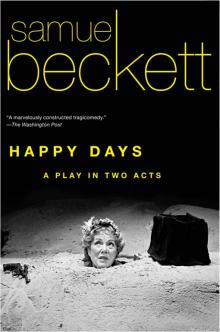 Happy Days
Happy Days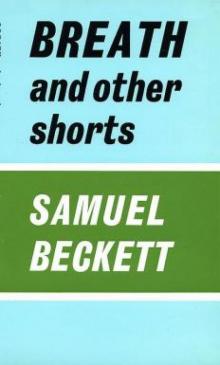 Breath, and Other Shorts
Breath, and Other Shorts Endgame & Act Without Words
Endgame & Act Without Words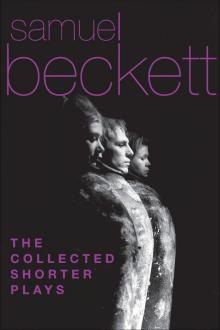 The Collected Shorter Plays of Samuel Beckett
The Collected Shorter Plays of Samuel Beckett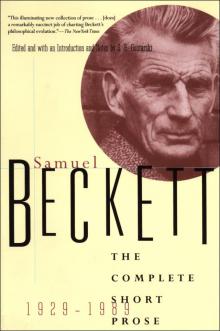 The Complete Short Prose, 1929-1989
The Complete Short Prose, 1929-1989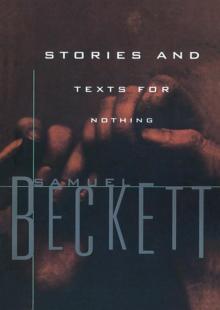 Stories and Texts for Nothing
Stories and Texts for Nothing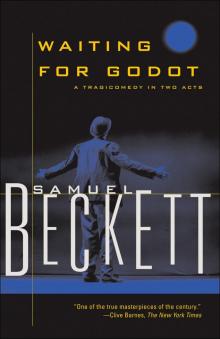 Waiting for Godot
Waiting for Godot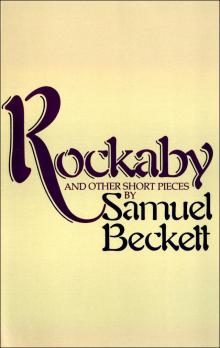 Rockaby and Other Short Pieces
Rockaby and Other Short Pieces First Love and Other Shorts
First Love and Other Shorts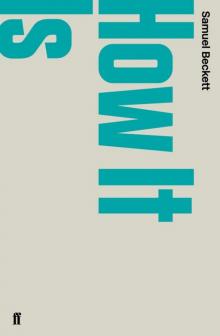 How It Is
How It Is Disjecta: Miscellaneous Writings and a Dramatic Fragment
Disjecta: Miscellaneous Writings and a Dramatic Fragment Echo's Bones
Echo's Bones Texts for Nothing and Other Shorter Prose 1950-1976
Texts for Nothing and Other Shorter Prose 1950-1976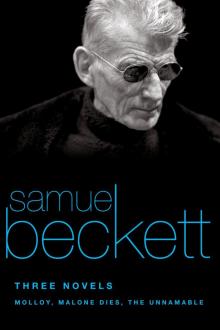 Three Novels
Three Novels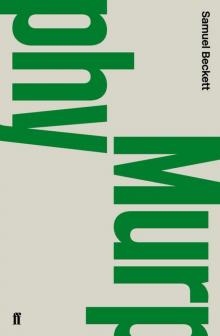 Murphy
Murphy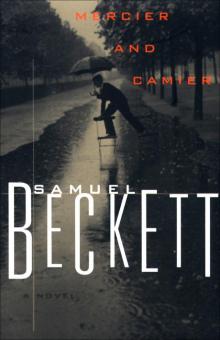 Mercier and Camier
Mercier and Camier Eleuthéria
Eleuthéria Selected Poems 1930-1988
Selected Poems 1930-1988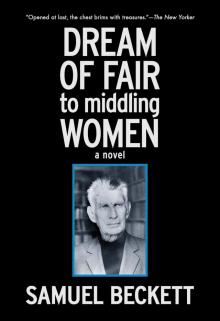 Dream of Fair to Middling Women
Dream of Fair to Middling Women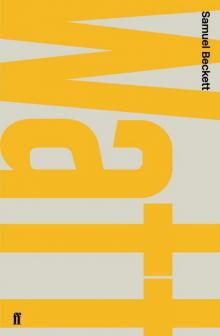 Watt
Watt Krapp's Last Tape and Other Dramatic Pieces
Krapp's Last Tape and Other Dramatic Pieces The Complete Dramatic Works of Samuel Beckett
The Complete Dramatic Works of Samuel Beckett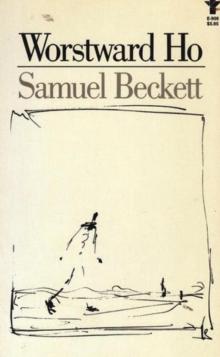 Worstward Ho
Worstward Ho Collected Poems in English and French
Collected Poems in English and French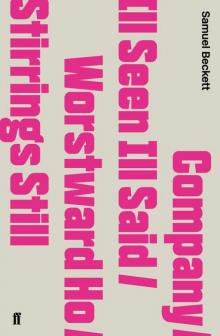 Company / Ill Seen Ill Said / Worstward Ho / Stirrings Still
Company / Ill Seen Ill Said / Worstward Ho / Stirrings Still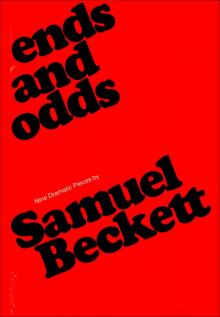 Ends and Odds
Ends and Odds Endgame Act Without Words I
Endgame Act Without Words I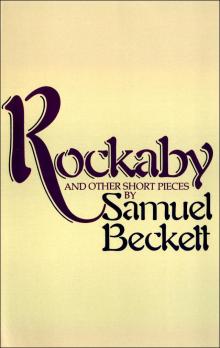 Rockabye and Other Short Pieces
Rockabye and Other Short Pieces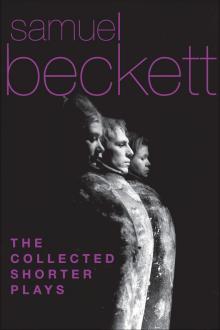 The Collected Shorter Plays
The Collected Shorter Plays The Complete Dramatic Works
The Complete Dramatic Works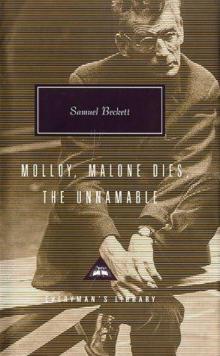 Three Novels: Malloy, Malone Dies, The Unnamable
Three Novels: Malloy, Malone Dies, The Unnamable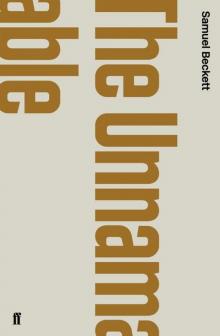 The Unnamable
The Unnamable